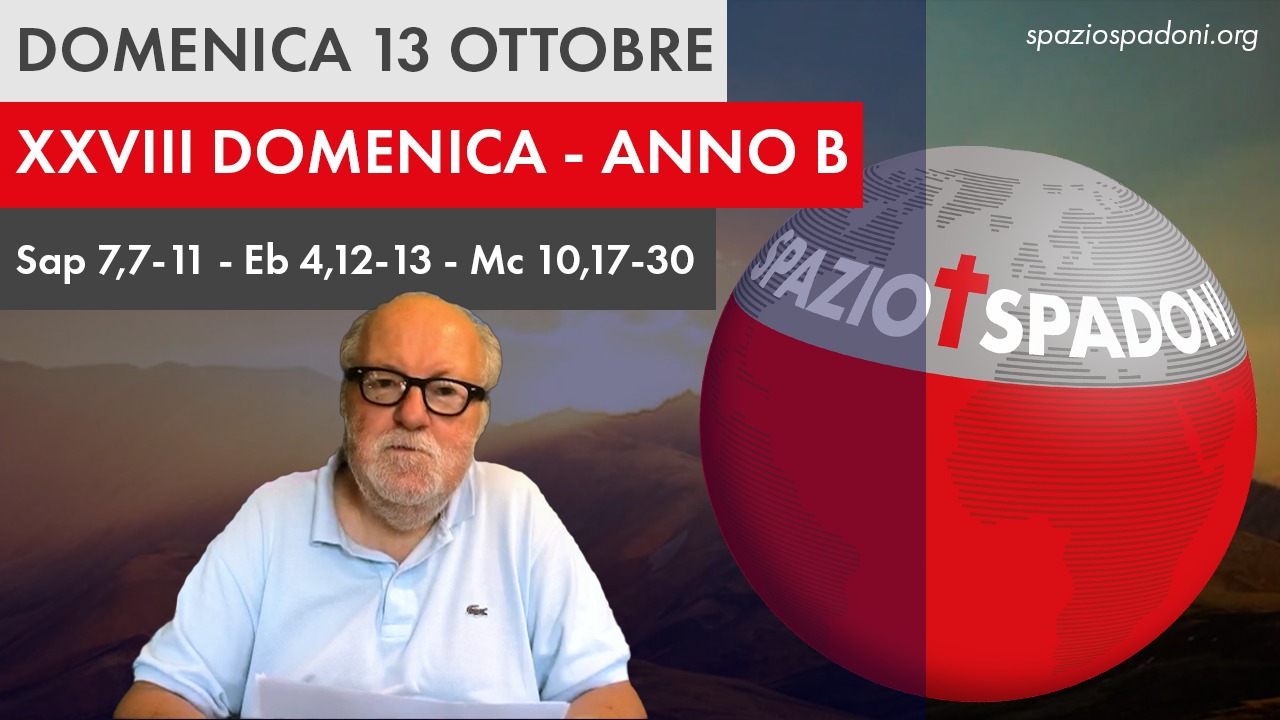
Sunday XXVIII Year B – The Call to Be Poor
Readings: Gen 2:18-24; Heb 2:9-11, Mk 10:2-16
Today’s Gospel page is one that the Church has always taken least seriously: “One thing you lack: go, sell what you have and give it to the poor” (Mark 10:21). Priests and nuns often live in beautiful mansions, houses, villas, with every comfort, and entrench themselves behind the usual, “All this is not mine anyway, it belongs to the diocese, the parish, the congregation…. And when I die I won’t leave anything to anyone….” Then let’s not talk about us lay people, who attend our churches with cars and cell phones, often owners of our first and second homes, and with the ever-present bank account…
The discomfort with this Word of the Lord was already evident in the early Church, which sweetened Luke’s harsh, “Blessed are you poor, for yours is the kingdom of heaven” (Lk. 6:20) into the softer, “Blessed are the poor in spirit” of Matthias’ memory (Mt. 5:3). But today’s Gospel does not express an “evangelical counsel”: it is a calling for all: it is “what we lack” (Mk 10:21). We must all then, with humility and serenity, stand before the Word of God, even if it hurts us, for “it is sharper than any two-edged sword, … penetrates to the dividing point of soul and spirit, of joints and marrow, and scrutinizes the feelings and thoughts of the heart … Everything is naked and uncovered in God’s sight, and to him we must give an account” (Heb. 4:12-13: Second Reading).
Let us therefore be obedient to the great proclamation of the Gospel: it is for the truly “poor” that Jesus’ “glad message” is “proclaimed” (Lk. 4:18; 7:22): and the meaning of “ptòchoi” is concrete, pointing in the Bible to people who are in misery, hunger, sickness. James will say, “Listen, my beloved brethren: has not God chosen the poor in the world to make them … heirs of the Kingdom?” (Jas. 2:5; cf. Paul in 1 Cor. 1:26-28). This is well understood by Mary who, in her groundbreaking canticle, the Magnificat, proclaims that God “has overthrown the mighty from their thrones, raised up the lowly; He has filled the hungry with goods, He has sent the rich empty-handed” (Lk 1:51-54; cf. 14:11; 18:14). And Jesus himself became poor (Mt 8:20; 2 Cor 8:9), chose the last place (Mt 20:28; Jn 13:12-17; Mt 21:5; Phil 2:7-8), and asked his disciples for effective poverty (Mt 6:19; Lk 12:33; 14:33; 19:21-24.27; Acts 2:44-45; 4:32).
In Jesus’ proclamation by word and example of the eschatological blessedness of the poor there is the great, joyful hope of all the wretched of the earth, who know that the Lord has truly become one of them, and this is for them a pledge of redemption, salvation, and certainty of deliverance and resurrection. But there is also a clear call to true poverty for all believers: because it is a necessary condition for accepting the Wisdom of God (Wis 7:7-11: First Reading; cf. Sl 49:13, 21: “Man in prosperity does not understand, he is like the animals that perish”); it is because sharing goods with the poor is an indispensable sign of loving the God we do not see in the brother we do see (1 Jn 4:20; 3:17-18).
A deep examination of conscience is needed from all of us who proclaim ourselves followers of Jesus but do not share the lot of the poor and live in the riches and comforts of this world. Certainly the way of “selling everything” for the family man will be different from that of the hermit: but we must all allow ourselves to be challenged and converted by today’s Word. And let us not take refuge too hastily, at least for once, in the fact that salvation, which under these conditions seems to us most difficult, is nevertheless not impossible to God (Mk. 10:27).
